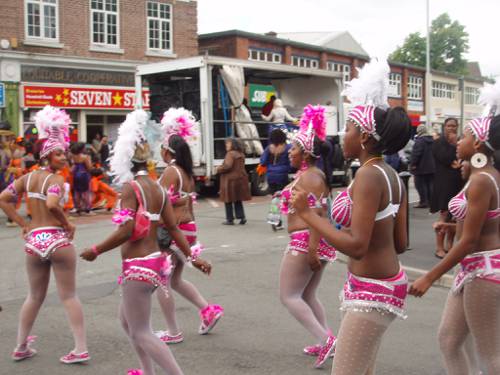
FAQ About The Impact of Caribbean Carnival on Global Cultural Exchanges

What is Caribbean Carnival?
Caribbean Carnival is a vibrant, colorful festival celebrated in many Caribbean countries. It features parades, music, dancing, and elaborate costumes, often reflecting African, European, and indigenous influences. The Carnival is marked by a spirit of freedom, expression, and community celebration, and it is held annually in various forms across the Caribbean and in communities around the world.

How do Caribbean Carnivals influence global cultural celebrations?
Caribbean Carnivals influence global cultural celebrations by introducing elements like vibrant costumes, lively music, and inclusive parades which have been adopted and adapted by other cultures. Events such as Notting Hill Carnival in London and Caribana in Toronto are direct descendants of Caribbean Carnival traditions, turning local festivals into multicultural events that attract global audiences.

What are some common features of Caribbean Carnival celebrations?
Common features of Caribbean Carnival celebrations include parades with elaborately decorated floats, lively music genres such as calypso, soca, and reggae, and dance forms like "wining". Participants often wear colorful, extravagant costumes representing folkloric or contemporary themes, and there is a strong emphasis on inclusivity and celebration of cultural identity.

How does Caribbean Carnival promote cultural dialogue?
Caribbean Carnival promotes cultural dialogue by serving as a platform where people from diverse backgrounds come together to celebrate, learn, and exchange cultural practices. It facilitates conversations about history, identity, and community through its music, costumes, and symbolic rituals, helping to build bridges between different cultural groups.

When did Caribbean Carnivals start spreading globally?
The spread of Caribbean Carnivals globally began in earnest during the mid to late 20th century. This was largely facilitated by migration patterns as Caribbean communities established themselves in cities outside the Caribbean, bringing with them their traditions and celebrations, such as Carnival, which was shared and embraced in their new homes.

What role does music play in Caribbean Carnival's global influence?
Music is a central element of Caribbean Carnival and its global influence. Genres like calypso, soca, and reggae have transcended borders, carried by the Caribbean diaspora and embraced worldwide. These music styles not only entertain but also communicate cultural stories and values, influencing the musical landscapes of various global festivals.

Which Caribbean Carnival events have had the most global impact?
Events like Trinidad and Tobago's Carnival are among the most influential, known for their scale and vibrant expression. This Carnival has spawned variations globally, particularly in cities with large Caribbean populations, such as the Notting Hill Carnival in London and Caribana in Toronto, which are the largest and most well-known Caribbean Carnivals outside the Caribbean.

How has the Caribbean diaspora contributed to the global spread of Carnival?
The Caribbean diaspora has been instrumental in the global spread of Carnival. Migrants took their cultural traditions, including Carnival, to their new homes, where these customs mixed with local cultures. This has led to the emergence of unique celebrations, such as the Brooklyn Labor Day Parade in New York, illustrating a blend of Caribbean and local influences.

Are there any misconceptions about Caribbean Carnival?
One common misconception is that Caribbean Carnival is only about partying and revelry. While it is certainly a time of celebration, Carnival also holds deep cultural, historical, and political significance. It serves as a means for expressing cultural identity, resisting colonial narratives, and promoting social unity.

How do Caribbean Carnivals impact tourism in host countries?
Caribbean Carnivals significantly boost tourism by attracting visitors from all over the world eager to experience the vibrant celebrations. This influx of tourists supports local economies, from hotels and restaurants to artisans selling crafts. The global popularity and visibility of Carnival events also promote the host countries as travel destinations year-round.

What are some examples of Caribbean cultural fusion in global Carnivals?
Examples of Caribbean cultural fusion in global Carnivals include the integration of Caribbean music and dance styles into local festivals. For instance, the Notting Hill Carnival in London showcases steelpan performances and soca music alongside British cultural elements, creating a unique multicultural event.

Why is Carnival important for cultural preservation?
Carnival is important for cultural preservation because it maintains and shares Caribbean cultural traditions, folklore, and history. It provides a visual and experiential narrative of cultural heritage, allowing both marginalised and mainstream communities to keep their stories alive, engage the younger generation, and educate the public on cultural significance.

How do Caribbean Carnivals address issues of inclusivity and diversity?
Caribbean Carnivals are inherently inclusive, welcoming participants from all walks of life to celebrate cultural diversity. They often reflect social themes and issues, providing a space to address matters like racial equality, unity, and community solidarity, thereby reinforcing messages of inclusivity and acceptance through the festivities.

What is the historical significance of Caribbean Carnival?
Historically, Caribbean Carnival has its roots in the emancipation of enslaved people, who used the celebrations to express freedom and cultural identity. The festival is a symbol of resistance and resilience, showcasing the rich tapestry of African, indigenous, and European influences that make up the Caribbean’s history and cultural identity.

How are modern technologies influencing Caribbean Carnival and its global reach?
Modern technologies such as social media and live streaming have greatly enhanced the global reach of Caribbean Carnival. These platforms allow real-time sharing of events, expanding the audience far beyond the location of the festivities. They also facilitate cultural exchange and community building by connecting enthusiasts and participants worldwide.

How does Caribbean Carnival contribute to cultural education?
Caribbean Carnival contributes to cultural education by providing an immersive experience where history, music, and art from Caribbean cultures are actively shared and celebrated. It creates avenues for learning about Caribbean traditions, promoting better understanding and appreciation of cultural diversity among global audiences.

What are the economic impacts of Caribbean Carnivals beyond tourism?
Beyond tourism, Caribbean Carnivals stimulate local economies through the arts and entertainment industries. They provide employment opportunities for musicians, artists, costume designers, and vendors. The preparation and execution of such large-scale events inject significant revenue into local businesses, supporting economic growth and community development.

In what ways have Caribbean Carnivals adapted to global audiences?
Caribbean Carnivals have adapted to global audiences by incorporating elements that resonate universally, such as accessible music genres and participatory dance routines. Organizers also consider cultural sensitivities and preferences while maintaining authenticity, allowing the essence of Caribbean culture to shine while engaging a wide array of participants and spectators.

How does Caribbean Carnival enhance globalization?
Caribbean Carnival enhances globalization by bringing together people from various nationalities and cultures to participate in a shared experience. This fosters an interchange of cultural ideas and practices, decreasing cultural silos and promoting a shared global identity that values diversity and mutual respect.

Are Caribbean Carnivals purely of cultural significance?
While Caribbean Carnivals are deeply rooted in cultural significance, they also hold social, economic, and political importance. They serve as a platform for dialogue on contemporary issues, promote tourism, influence music and fashion industries, and offer a space for community engagement and cultural diplomacy.
